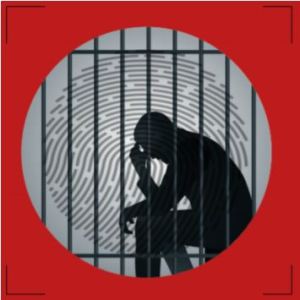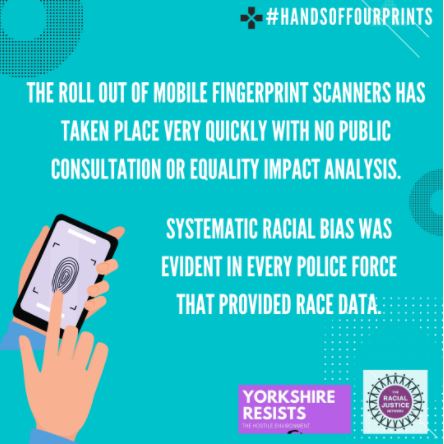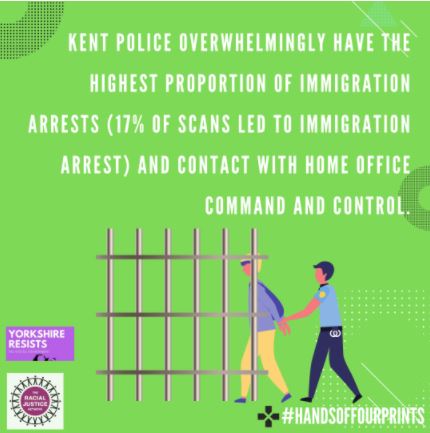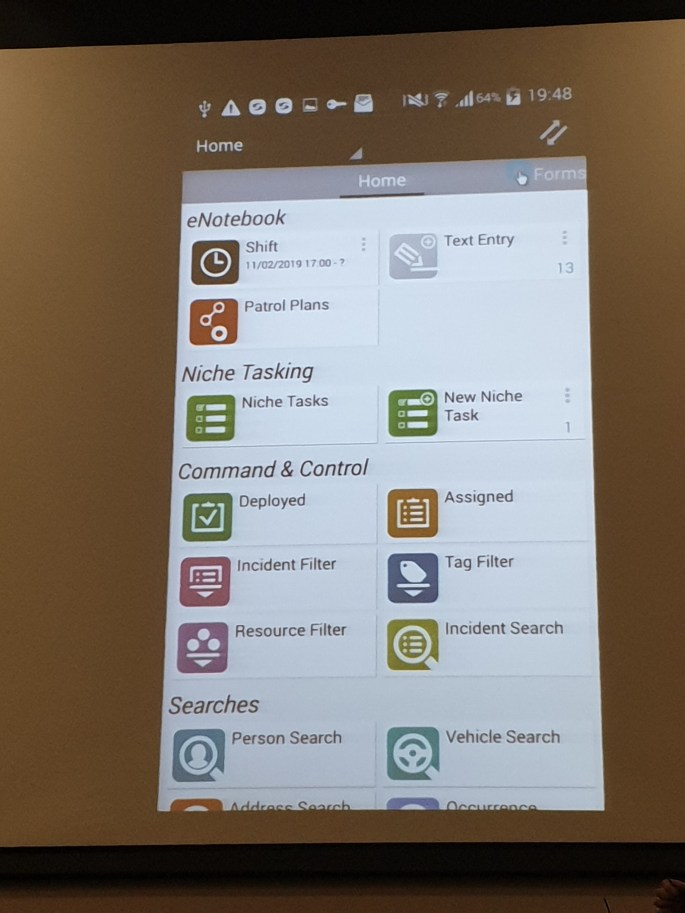
The Racial Justice Network and Yorkshire Resists, in conjunction with Queen Mary University of London, released a new report written to draw attention to the national use of the Biometric Services Gateway (mobile fingerprinting) by police forces. The report discusses issues that arose from new data obtained through a Freedom of Information (FOI) request from the period of March 2019 to June 2020 to all police forces in the UK.
Mobile biometric devices are handheld fingerprint scanners that police officers can use to check, on the spot, a person’s identity by matching the image of the fingerprint taken against the IDENT1 criminal record database and the Home Office IABS database without taking the individual into custody. The scanners can be connected to any mobile phone or tablet that also runs the corresponding app which allows the biometric databases to be searched.
After listening to concerns coming from the communities we work with, and conducting a report on the local use of the devices, the Racial Justice Network and Yorkshire Resist sought to further understand how the devices were being used across the U.K. felt a report was needed to draw further attention to the unethical and targeted use of mobile fingerprint scanners.
Our first report revealed the main concerns regarding the use of biometric fingerprinting device was the damage to relations between racially minoritised communities and police who were seen as carrying out Immigration Enforcement checks, as well as the dissuasion of reporting crimes by those with precarious immigration status, seeking asylum and visa holders. This second report builds on these concerns by drawing attention to how police forces across the UK are using these devices and further highlights the adverse national impact of increased police powers within the context of increasing surveillance technology.
Key themes identified in our report:
- The FOI analysis on the use of mobile biometrics showed the roll out of mobile fingerprint scanners has taken place very quickly with no public consultation or equality impact analysis.
- Systematic racial bias was evident in every police force that provided race data.
- There is no consistency across police forces as to when or why they use this technology. There is no consistent approach to checking fingerprints through the databases. Each police authority implements a different approach with no clear justification or rationale. It is very unclear why police search only the immigration database (IABS) or the police database (IDENT 1) or both.
- England is the only country in the UK that piloted this technology and is in the process of hastily deploying it. Two police forces in Wales piloted the scheme in 2019 and are not continuing its roll out. Police Scotland and North Wales Police emphatically stated they have not and will not use mobile fingerprint scanning given legal and ethical concerns.


Key findings from our report include, but are not limited to:
- The highest number of scans per area are Met Police (34 in 10,000), Surrey Police (24 in 10,000) Cheshire Police (17 in every 10,000) and Lincolnshire Police (15 in 10,000).
- For every White North European person stopped and scanned in every 10,000 people, 48 Arabic people are scanned on average across the police jurisdictions.
- 14 Black residents are scanned for every White North European, 14 Asian people, almost 4 Chinese people or 2 South East Asian people for every White North European.
- Kent Police overwhelmingly have the highest proportion of immigration arrests (17% of scans led to immigration arrest) and contact with Home Office Command and Control.
We are not only asking for proper ethical duty and processes to be undertaken, we are asking the police force to listen to these concerns. Our survey ultimately demonstrates the introduction of the Biometric Services Gateway runs fundamentally against public interest and that police becoming a border force means inflicting further harm on racially minoritised who they are required to protect under the Equality Act.
Questions of where public resources are best directed remain a pertinent issue and, in the ‘Recommendations’ section, our report points towards the importance of investing in community advocates, organisations and charities who continuously support individuals experiencing police discrimination or who are victims of hate crimes.
Download the pdf report on STOP THE SCAN: Police use of mobile fingerprinting technology for immigration enforcement:

